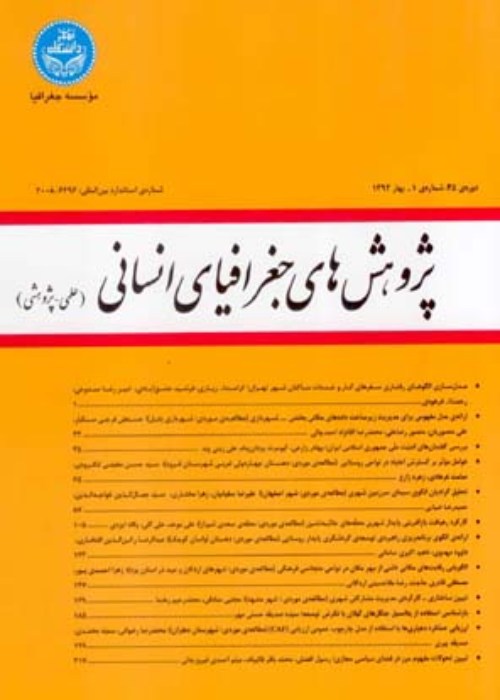Stability analysis of the relationship between family farming systems and food security in ghanibiglo rural areas
Author(s):
Abstract:
Introduction
Toachieve the objectives of food security andagriculture, including its effective roleinstreng the ningnational independence requiresfast and accuratetransition froms tagetostage in the production of traditional livelihoods andindustrial productionand trade. The other handpursuit of sustainable agriculture todayasan approachto agriculture that made it possible to begin commercial production and food security of rural households makesit possible. In family uses about 80 percent of total agricultural uses accounted for, and thereforethe relationship between thein terest collected and food security in rural areasis of utmost importance, In this regard, this study also analyzes there lationship between thefood security and sustainable agricultureis discussed.Research
Methodology
According to the studyin order to identify the relationship between food security and ther uralrich family uses bigelowis, therefore obeys the function al approach. This study is the descriptive research method-correlation analysis is carried out using the method. Research is a two section documentary and in section documentary through library research to gather background and theoretical Research, and a small section to analyse the data has been paid. Basic dataon the status of food security and sustainability of family farming systemin the coanty is ghani-bigelow questionnaire. The questionnaire consisted of three parts: descriptive questionssuch as age, sex, education, food security status, a second batch of questions relating to the sustainability off amily farming systems in sustainable agriculture and household food security operation in the third part of the question concerning the form cartstandard commodity the Ministry of health requirements. according tomultiplestudies, the authors of 10 socialindicators, economic in dicatorsand 9 nineen vironmental in dicatorsto identify the factors affecting the economic, social, environmental and food security in the lives of beneficiaries were selected in the city of Zanjan. Since the total study population in cluded 1,324 family farmersin 8 rurals areselected, among them, using Cochran formula and table sample volume of 300 farmers were selected to complete the questionnaire and data necessary to navigate the desired 8 rurals were selected at random and were carefully collected. Spss software for data analysis and one-sample t-test for test for analyzing the stability of the family operation, Tukey's test, Pearson's chi-square tables to examine the relation taking advantage of the family and the general index correlation test for the relationship between sustainability and social and economic characteristics of interest - family farmers and food security were used.Research findings :Descriptive findings indicate that individual characteristics of users, withan average age of 44.6 years for men and 94.8% among men and 5.2 percent of the mare women.Average family size of 4.3 persons perhousehold operation. In terms of education,19.6 percent were illiterate, 29.9% had primary school education, school education, 17.5 percent, 11.5 percent, education, high school diploma,12.8 percent, 8.7 percent havea bachelorsor higher graduateed ucation.The findings in relation to food security status of household sin the study rurals how among the items in the commodity basket standard provided by the ministry of health, there was only a poor person's consumption and the highest rate of poverty among food items, meat, fish and vegetables are.Thefindingsshow that 20.13 percent and 41.91 percent in the statistical community in absolute poverty, relative poverty live.
Conclusions
Analytic alresultsrelated to food security and sustainable family farming systems in ghani-biglwe rurals rich in zanjan township shows that, Stable operation of the systemis not in acceptable condition and the average family size in all three dimensions of sustainability in economic, environmental and social desirability of numeric negatively be assessed. In the second analysis, result sindicate statistically significant differences between the dependent variables tudied food security in rural households of farmers and sustainable agriculture is the independent variable. The following resultss how that based on sustainable agriculture, rural farmers were no significant differences in household food security is achieved and the positive direction of this relationshipis estimated that the association is indicated. So we can say that by increasing the sustainability of agricultural systems exploit a rich family in a county ghani-bigelow, food security at the household will increase proportionally. Keywords:
Language:
Persian
Published:
Human Geography Research Quarterly, Volume:48 Issue: 95, 2016
Pages:
197 to 209
magiran.com/p1515530
دانلود و مطالعه متن این مقاله با یکی از روشهای زیر امکان پذیر است:
اشتراک شخصی
با عضویت و پرداخت آنلاین حق اشتراک یکساله به مبلغ 1,390,000ريال میتوانید 70 عنوان مطلب دانلود کنید!
اشتراک سازمانی
به کتابخانه دانشگاه یا محل کار خود پیشنهاد کنید تا اشتراک سازمانی این پایگاه را برای دسترسی نامحدود همه کاربران به متن مطالب تهیه نمایند!
توجه!
- حق عضویت دریافتی صرف حمایت از نشریات عضو و نگهداری، تکمیل و توسعه مگیران میشود.
- پرداخت حق اشتراک و دانلود مقالات اجازه بازنشر آن در سایر رسانههای چاپی و دیجیتال را به کاربر نمیدهد.
In order to view content subscription is required
Personal subscription
Subscribe magiran.com for 70 € euros via PayPal and download 70 articles during a year.
Organization subscription
Please contact us to subscribe your university or library for unlimited access!



